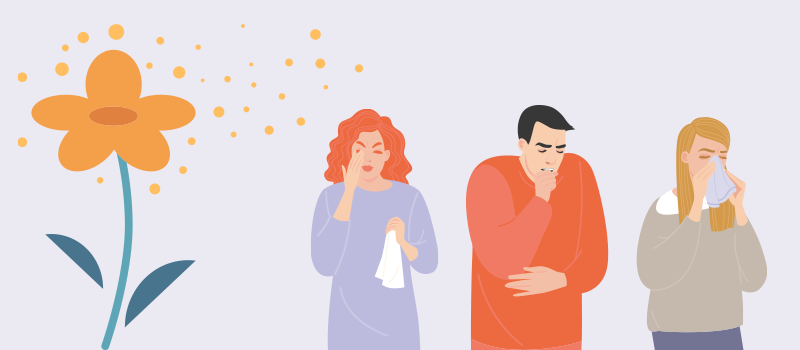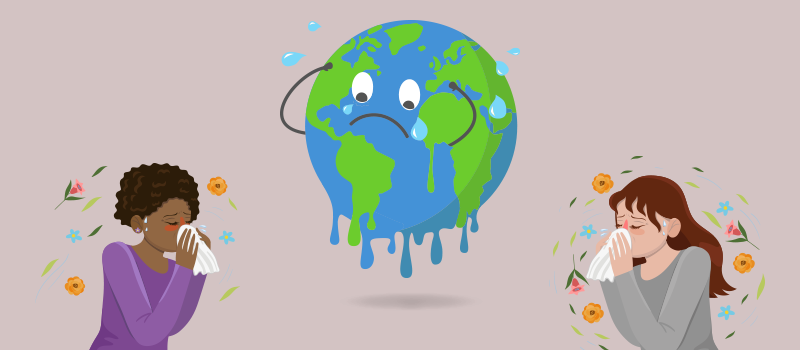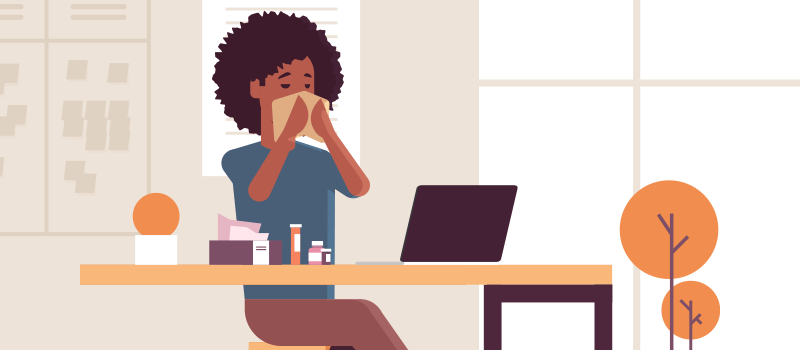What’s the Buzz
The Bee Healthy Blog
How to Prepare for Seasonal Allergies

Approximately 24 million Americans suffer from seasonal allergies (also called allergic rhinitis or hay fever). In people who have seasonal allergies, the immune system overreacts to common allergens like pollen from trees, grasses, and weeds. This causes allergic reactions that are typically worse during the peak pollen season. If you suffer from seasonal allergies starting in early spring when pollen levels rise, please continue reading. This article will give you some tips on how to prepare for seasonal spring allergies.
When is allergy season?
In many parts of the United States, seasonal allergies begin in the spring and continue all the way to late summer and early fall. Tree pollen tends to trigger early spring allergies, followed by grass pollen in the late spring and summer and ragweed in the late summer and fall.
What are seasonal allergy symptoms?
Seasonal allergy (hay fever) symptoms include itchy, watery eyes, runny nose, stuffy nose, nasal congestion, sneezing, and scratchy throat. Allergy sufferers with allergic rhinoconjunctivitis can develop eye allergy symptoms like tearing, itching, and swelling.
How can I prepare for spring allergies?
Here are some tips to help you combat spring allergy symptoms:
Avoid allergy triggers
A seasonal allergy occurs due to an allergic reaction in which your immune system produces antibodies to common triggers like pollen, mistaking them for dangerous substances. You can reduce your exposure to allergy triggers with the following strategies:
- Track pollen counts and stay indoors on days with high pollen counts.
- Avoid spring cleaning to reduce dust mites.
- Avoid gardening chores like weed pulling and lawn mowing, which can stir up or release pollen.
- Wear a face mask or filter mask when outdoors to reduce pollen exposure.
- Change your clothes and shower when you come inside from the outdoors.
- Don’t hang laundry to dry outside because pollen can stick to your clothes and bed linen.
Track pollen counts
To reduce your pollen exposure, it’s a good idea to monitor local pollen counts from weather reports. Mornings are usually peak pollen hours. Pollen counts are also high on dry, windy days. Rain helps to bring down the pollen count.
- Stay indoors in the early morning and early evening when pollen levels are highest.
- Keep windows and doors closed as much as possible.
- Start taking allergy medications before symptoms begin if high pollen counts are predicted.
Keep indoor air clean
Allergens are everywhere. Avoiding allergens means not only staying indoors during allergy season but also keeping indoor air clean. For symptom relief when you are indoors:
- Use air-conditioning in your home and car to keep the air inside as free of allergens as possible.
- If your air-conditioning system does not have an air filter, use an air purifier with a high-efficiency particulate air (HEPA) filter to clear pollen from indoor air.
- Keep your indoor air dry with a dehumidifier (mold grows in high heat and humidity).
- Use a vacuum cleaner frequently and make sure it has a HEPA filter.
Use over-the-counter medications
There are many over-the-counter (non-prescription) medications that can relieve allergy symptoms, such as:
- Oral antihistamines like loratadine (Claritin), fexofenadine (Allegra Allergy), and cetirizine (Zyrtec Allergy).
- A steroid nasal spray like triamcinolone (Nasacort), budesonide (Rhinocort), or fluticasone (Flonase). Do not use steroid nasal sprays long-term without talking to your doctor first.
- Oral decongestants like pseudoephedrine (Sudafed) can help clear your nasal passages if you have bad nasal congestion during allergy season.
- Cromolyn sodium nasal spray. This needs to be used 3-6 times a day and can take up to 4 weeks to work, but it is safer than steroid nasal sprays. You should ideally start this allergy medicine a few weeks before allergy season starts.
- Nasal irrigation kits. Rinsing your nose and sinuses with a saline solution can provide relief from nasal stuffiness and flush out allergens from your nose. You can purchase a ready-made kit or use 1 liter of boiled water, 1.5 teaspoons of salt, and 1 teaspoon of baking soda to make a homemade solution.
- Herbal remedies like butterbur and bromelain appear to help some people with seasonal allergies.
Can you desensitize yourself to seasonal allergies?
Yes, you can desensitize yourself to seasonal allergies with immunotherapy treatment or allergy shots. These are regular injections given after you are allergy tested. They contain tiny amounts of the specific substances that cause allergic reactions and allergy symptoms. The shots are given over a period of three to five years and can gradually desensitize you to seasonal allergies and reduce or stop your allergy attacks.
Talk to your doctor about getting an allergy test to find out what substances trigger your seasonal allergies. Your doctor may recommend allergy shots if allergy medication does not relieve your symptoms.
How can I strengthen my immune system for seasonal allergies?
The best way to strengthen your immunity and reduce the impact of seasonal allergies is to eat a healthy diet, get regular exercise, avoid tobacco, limit alcohol consumption, and get at least 8 hours of sleep every night.
References:












SOCIAL